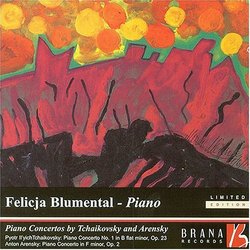| All Artists: Pyotr Ilyich Tchaikovsky Title: Piano Concertos by Tchaikovsky and Arensky Members Wishing: 0 Total Copies: 0 Label: Brana Records Original Release Date: 3/5/2004 Release Date: 3/5/2004 Album Type: Import Genre: Classical Styles: Chamber Music, Forms & Genres, Concertos, Historical Periods, Classical (c.1770-1830), Modern, 20th, & 21st Century, Instruments, Keyboard Number of Discs: 1 SwapaCD Credits: 1 UPCs: 821158101322, 803680442753 |
Search - Pyotr Ilyich Tchaikovsky :: Piano Concertos by Tchaikovsky and Arensky
 | Pyotr Ilyich Tchaikovsky Piano Concertos by Tchaikovsky and Arensky Genre: Classical
The first of these Russian piano concertos by Pyotr Il?yich Tchaikovsky is one of the World?s most famous classical masterpieces and instantly recognisable from it?s introduction. Tchaikovsky first began composing the wor... more » |
Larger Image |
CD Details
Synopsis
Album Description
The first of these Russian piano concertos by Pyotr Il?yich Tchaikovsky is one of the World?s most famous classical masterpieces and instantly recognisable from it?s introduction. Tchaikovsky first began composing the work in 1874 while studying at St. Petersburg Conservatory under Anton Rubinstein. On completion, he gave the manuscript to pianist, Nicolas Rubinstein (brother of Anton) to whom the work was dedicated. Nicolas? reaction was unfavourable which greatly annoyed Tchaikovsky so he substituted the name for Hans von Bulow, who praised it?s style and form, performing the première in 1875 with the Boston Symphony Orchestra. Anton Arensky composed his Piano Concerto in F minor, Op 2 in 1882 at the age of 21, the same year he began teaching at the Moscow Conservatory. It is reminiscent of Chopin in it?s virtuoso passages but keeps it?s Russian character, very similar to the styles of Tchaikovsky (with whom he made a close association) and Rimsky-Korsakov, his teacher at St. Petersburg Conservatory. It too has a tense and dramatic opening first movement which leads into the piano theme, but it?s the ?dance like? third movement in which Ms. Blumental particularly sparkles and it?s here that Arensky entertains his fascination for irregular time signatures with a 5/4 finale.

 Track Listings (6) - Disc #1
Track Listings (6) - Disc #1